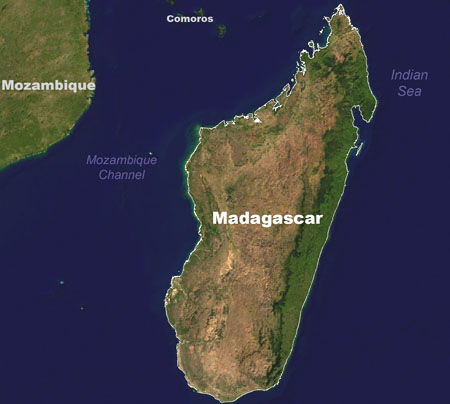|
CAS IN MADAGASCAR
Located off the southeast coast of Africa in the Indian Ocean, Madagascar is the fourth largest island in the world. Evolving over 80 million years in isolation from Africa, many of the species on Madagascar are found no where else on Earth. For example, 96 percent of all described native ants are endemic, and entomologists predict that only 1/3 rd of all ant species on the island have even been described. In 1998, CAS initiated a four year biological survey on the island continent of Madagascar, spearheaded by the Entomology dept. Although Madagascar ranks as one of the world’s highest conservation priorities, the arthropod fauna of the island is poorly known, especially outside the eastern humid forested regions. Local Malagasy scientists and biology students accompanied Academy entomologists, botanists, and invertebrate zoologists as they collected insects, plants, spiders and other invertebrates in lesser known regions of the island. The results derived from these surveys will provide local and international agencies with important baseline information on the biodiversity of this unique island. For more information about the project and its participants, see the Entomology department’s Madagascar expedition website.
Learn more about the people and institutions involved and our conservation actions in Madagascar.
|
 |
People and Institutions
Recognizing that most biological research in Madagascar has focused on the island’s vertebrate species, CAS scientists have focused on surveying Madagascar’s invertebrates and plants. In 1998, the National Science Foundation awarded funding to Entomology Dept. chair Dr. Brian Fisher and Academy arachnologist Dr. Charles Griswold for an unprecedented four year arthropod inventory of the island. Recently, Graduate student, Hannah Wood and Dr. Charles Griswold discovered nine new species of Assassin spiders (Eriauchenius spp.) as a result of this survey and they are confident many more wait to be discovered. CAS Botany Curator Dr. Tom Daniel is describing new species of Acanthaceae, commonly known as shrimp plants. All 80% of the shrimp plants from Madagascar are found nowhere else in the world. Invertebrate Zoology Research Associate Neil Fahy created a guide to the land snails of Ranomafana National Park. Additional funding was provided by the McBean Family Foundation, the Oracle Foundation, the Lakeside Foundation, and the Schlinger Foundation to continue research and operate a lab facility in Madagascar’s capital, Antananarivo. Experts from the South African Museum in Cape Town as well as students from San Francisco State University and from Antananarivo University participated in the expeditions and assisted in the processing of specimens. Research continues and future expeditions to the country’s marine habitats are beginning to be planned.
Conservation Actions
Habitat loss is the largest threat to biodiversity on Madagascar, with 90 percent of the country’s original forest cover already lost. Currently, the Malagasy government is actively committed to increasing the area under protection, as well as improving management of protected areas already designated. CAS’ Madagascar research projects directly support these efforts. Documenting species diversity and analyzing patterns of species richness, turnover, and endemism are critical tools, both for establishing new conservation priorities and for developing management plans for existing protected areas. CAS scientists and our Malagasy collaborators are generating this information inside several nature reserves, such as Ranomafana National Park and Tsimbazaza Botanical and Zoological Park, as well as in poorly known, uninhabited regions with future potential as protected areas. Results are presented online to ensure broad access to the data resulting from our research efforts. We are also training young Malagasy biologists to create the human resource capacity for managing and conserving the islands biodiversity.
Read about new species described by CAS research in Madagascar
|

